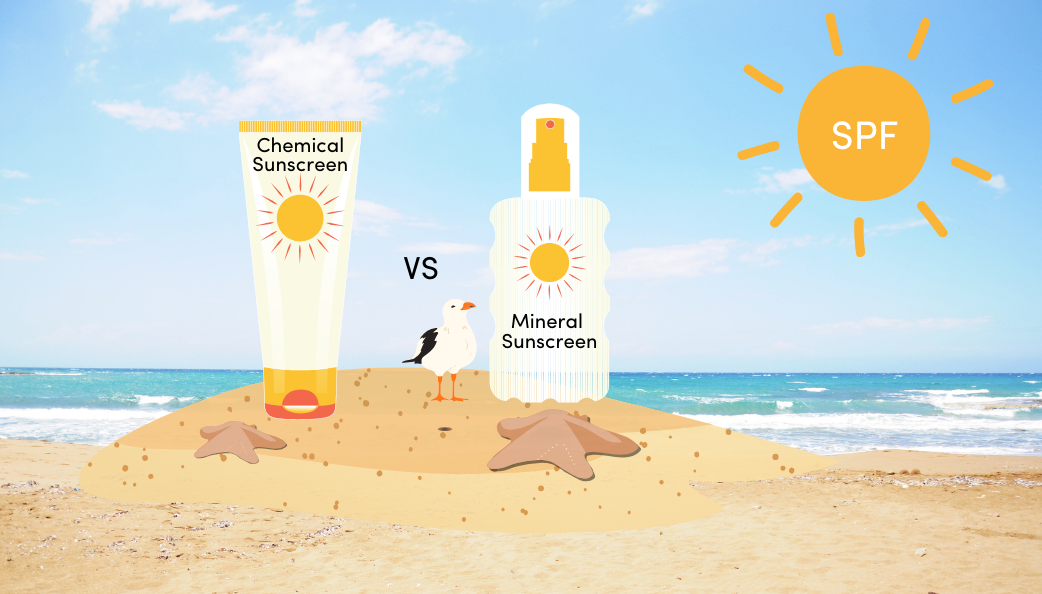
Aug 01 , 2024
Chemical vs. Physical Sunscreens - Which One Is Right for You?
Introduction:
As we bask in the sun's warmth, it's critical to protect our skin from its damaging rays to avoid sunburns, premature aging, and even skin cancer. Enter sunscreen, our steadfast ally in the fight against UV damage. But were you aware that not all sunscreens are made equal? In this post, we'll look at the differences between chemical and physical (mineral) sunscreens, so you can confidently traverse the sunscreen aisle and select the best option for your skin.
Chemical Sunscreens:
Chemical sunscreens work by absorbing UV rays and converting them into heat, which is then released from the skin. These sunscreens contain active ingredients such as avobenzone, octinoxate, and oxybenzone, which penetrate the skin and offer broad-spectrum protection against both UVA and UVB rays.
Pros and Cons of Chemical Sunscreens:
|
Pros |
Cons |
|
Lightweight and Easy to Apply |
May cause skin irritation or allergy reactions in some individuals |
|
Often less visible on the skin |
Requires time to absorb into the skin before becoming effective |
|
Offer broad-spectrum protection against both UVB and UVA rays |
Some chemical filters have been associated with potential hormone disruption or environmental concerns |
|
Can provide a more uniform coverage, especially for larger areas of the body |
Physical Sunscreens:
Physical sunscreens, also known as mineral or inorganic sunscreens, work by creating a physical barrier on the skin's surface that reflects and scatters UV rays. These sunscreens contain active ingredients such as zinc oxide and titanium dioxide, which sit on top of the skin and deflect UV radiation away from the body.
Pros and Cons of Physical Sunscreens:
|
Pros |
Cons |
|
Gentle and suitable for sensitive skin types |
Can leave a white cast or be more visible on the skin (more likely to occur with higher concentrations of zinc oxide or titanium dioxide) |
|
Provides immediate protection upon application |
Thicker and may feel heavier on skin (may case discomfort for some individuals) |
|
Less likely to cause skin irritation or allergic reactions |
May require frequent reapplication after swimming or sweating. |
|
Offers a broad-spectrum protection against UVA and UVB rays |
|
|
Tends to be more stable and less likely to degrade in sunlight |
Choosing the Right Sunscreen for You:
Ultimately, the choice between chemical and physical sunscreens is based on personal preference, skin type, and individual requirements. If you have sensitive skin or are prone to allergic reactions, physical sunscreens may be more suitable. A chemical sunscreen, on the other hand, may be a better alternative if you want something lightweight that blends in with your skin.
Topical Sunscreen Guide:
Here is a list of sunscreens available on Dermaskinshop SG:
|
Sunscreen |
Chemical or Mineral? |
| 1. Heliocare Advanced Gel SPF50/Ultra 90 |
Chemical and Mineral Filters |
| 2. Heliocare Color Gelcream SPF50 |
Chemical and Mineral Filters |
| 3. Heliocare 360º Pediatrics Mineral SPF 50+ |
Mineral Filters |
| 4. Heliocare Spray SPF50 |
Chemical and Mineral Filters |
| 5. Heliocare Colour Sun Touch SPF50 |
Chemical and Mineral Filters |
| 6. Heliocare 360º Pediatrics Atopic Lotion SPF 50 |
Chemical Filters |
Conclusion:
Whether you use a chemical or physical sunscreen, the most important thing is to incorporate sun protection into your daily skincare routine. Look for a broad-spectrum sunscreen with an SPF of 30 or greater, and remember to reapply frequently, especially if you're spending time outside. By selecting the best sunscreen for your needs and using it frequently, you may enjoy the sun while protecting your skin from damage for years to come.
Stay sun-safe, everyone!


